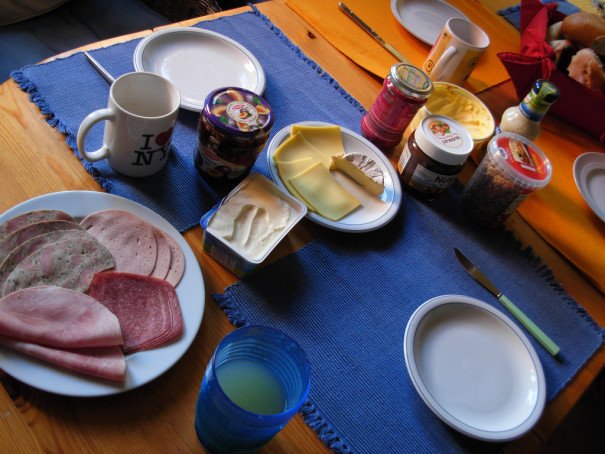
When Breakfast Becomes Dinner and Then Breakfast Again

When Breakfast Becomes Dinner and Then Breakfast Again
Head Cheese and Bread in Trier
Germans don’t do extravagance. They don’t go in for excess. So when invited into a German’s home for breakfast, it may come as a shock to see the entire table covered, without an inch to spare. There’ll be sliced meats and cheeses, hard-boiled eggs and jars of spreads, plus at least three different types of bread and several kinds of crusty rolls. It isn’t just how much is on the table that’s surprising; it’s the fact that this may be almost exactly what you had for dinner the night before.
Due to an odd obsession with sleeping soundly, and the conviction that this might have to do with one’s dietary health, Germans have been perfecting what they call Abendbrot—a light evening meal of bread adorned with something—for years, reserving the hotter, heavier, and larger meal for lunchtime. How this came to pass in one of the world’s most productive countries remains a mystery, considering the fact that these larger midday meals hit the stomach like a hot stone, and that Germany has no real siesta to speak of.
But back to breakfast, which you can now see is really the same as dinner. Germans don’t like to make a show of abundance, yet breakfast with guests is the one time of day they’ll choose to show off. I’d been living in Berlin for over a year when I first encountered this breakfast excess, but it wasn’t in the German capital where I was given my initiation. Sure, Berlin restaurants are well-known for their brunch spreads, but, Berlin being a haven for those living on the cheap, those lured in by promises of “all-you-can-eat for €10 per person” are often met with the telltale sliminess reserved for cold cuts just taken out of their supermarket packaging, the slight giveaway crustiness of sliced cheese that has sat too long in plastic.
No, I was in Trier, a pretty little city about as far southwest as you could go without hitting Luxembourg, and I was staying with a family who had a Metzger (butcher), a Bäcker (baker) and a Biokäserei (organic cheese-maker) all within reach. And so the table was covered in breads accompanied by half-full jars of homemade jams, each with its very own little jam spoon. Some, no doubt, made from berries picked at their own family Dacha just out of town. I was at last getting the chance to sample three kinds of sausage alongside head cheese, Schwarzwald or black forest ham, and liverwurst in its casing, plus Edamer (Edam), Bergkäse (mountain cheese) and Gouda all artfully laid out on a plate. Even the hard-boiled eggs were there, nestled inside an enormous eggwarmer in the shape of a quietly satisfied mother hen. I could predict the uneaten eggs would end up sliced and on the dinner table by evening. I could also pick out the slices of uneaten bread we’d been rude enough to leave on our plates the night before. No matter, anything we didn’t eat for breakfast could be recycled for Abendbrot once more.
What I didn’t see on the breakfast table were pickled pearl onions and garlic slices, cornichons and sun-dried tomatoes in oil; really anything that might leave a suspicious stink on the tongue. The night before had been a rollicking good time, with local riesling followed by whiskey followed by rounds of cards and sing-alongs with the extended, somewhat tipsy family. The morning’s Abendbrot was decidedly less enthralling, and yet the two were essentially the same meal.
At once I saw through the cornucopia of the breakfast table to the essential frugality and reserve of the German lifestyle lying beneath, but I wasn’t about to point that out to the kindly woman expectantly pulling out a chair and pouring my coffee. Because when Germans finally break their all-time favorite rule against indulgence—or at least, believe they’re breaking it—they should be, well, indulged.